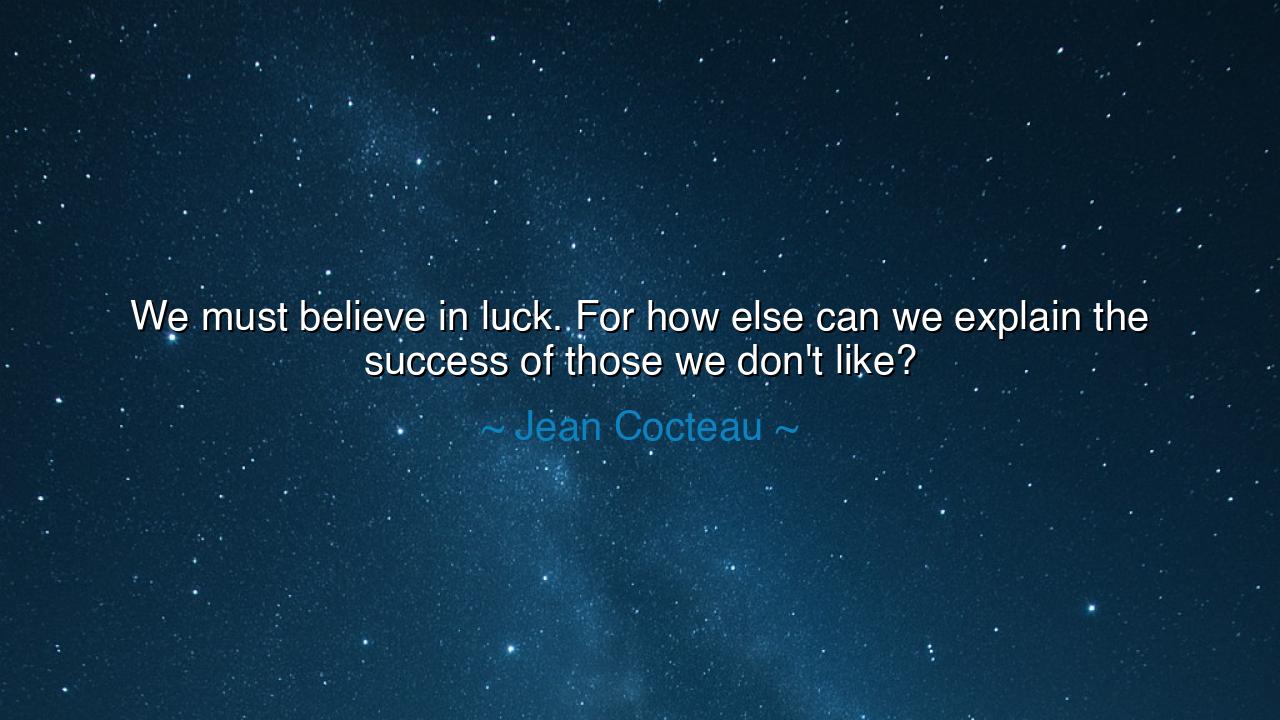
We must believe in luck. For how else can we explain the success
We must believe in luck. For how else can we explain the success of those we don't like?






Jean Cocteau, poet and visionary, once uttered with piercing wit: “We must believe in luck. For how else can we explain the success of those we don’t like?” At first, his words sound like jest, but beneath their humor lies an ancient truth. He reminds us of the mystery of fortune: how the crown sometimes rests on heads unworthy, how glory often falls upon those whose hearts seem cold, whose deeds appear lesser. To the human spirit, which yearns for justice and balance, this feels unbearable. And so, says Cocteau, we invoke luck—that strange and unpredictable spirit—to explain what reason cannot.
The ancients, too, wrestled with this paradox. The Greeks spoke of Tyche, the goddess of fortune, who spun her wheel without care for merit. Kings and beggars alike were at her mercy. The Romans built temples to Fortuna, believing her favor could never be earned but only received. In every age, men saw the unworthy prosper and the worthy struggle, and to make sense of this, they named it luck. Cocteau, with sharp tongue, merely translates this ancient lament into modern form.
Consider the tale of Alcibiades, the Athenian statesman. Brilliant, but reckless; ambitious, but treacherous. Many despised him, yet fortune seemed always at his side. Time and again, though his actions brought ruin to others, he returned to power, draped in influence. His contemporaries wondered: was it skill? Was it cunning? Or was it simply the strange favor of luck? To those who detested him, only luck could explain his enduring success. His story proves Cocteau’s point: sometimes fortune smiles most upon those we least admire.
But this quote is not only a jest about others; it is also a mirror for ourselves. When we see those we dislike rise, our hearts burn with envy, and we whisper of luck to soothe the wound. For if their triumph is luck, then our failure is not weakness. If their crown is fortune, then our struggle is not shame. Cocteau exposes both the bitterness of human jealousy and the comfort of blaming luck. His words are both playful and piercing: we believe in luck because it helps us endure what feels unfair.
And yet, there is wisdom here beyond cynicism. For though fortune may sometimes favor the unworthy, it does not favor them forever. History is filled with men and women lifted by chance, only to be cast down again when their hollowness was revealed. Luck may grant a crown, but it cannot teach one how to wear it. In the end, only character sustains success, and those without it are often destroyed by the very fortune that raised them.
The lesson for us is this: do not waste your soul in bitterness when others rise. Do not gnash your teeth at the success of those you dislike. Instead, turn inward. Build your own life not on luck, which is fickle, but on strength, discipline, and virtue. For though luck may raise others for a season, true greatness is carved by hands that labor and hearts that endure. Trust not the wheel of fortune, but the foundation of effort.
Practical wisdom follows: when you see another’s success, especially one you deem unworthy, let it not poison you. Smile, and call it luck if you must, but then return to your work. Do not measure your path by theirs, for envy is a thief of energy. Instead, anchor yourself in what you can control—your craft, your patience, your persistence. In time, you will find that while luck comes and goes, the fruit of steadfastness remains.
So let Cocteau’s words be remembered not only as wit, but as wisdom: “We must believe in luck. For how else can we explain the success of those we don’t like?” Accept that fortune plays her strange games, but never bow to her as master. Build your house on stone, not on the wheel of chance. And when others rise by luck, let it not trouble your spirit—for the greatest success is not to be lifted by fortune, but to stand unshaken when fortune falls away.






AAdministratorAdministrator
Welcome, honored guests. Please leave a comment, we will respond soon